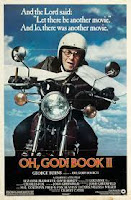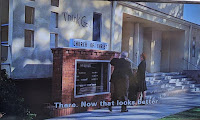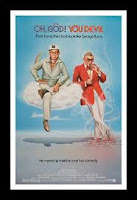Local Hero (1983)
As we’ve said here many times, we at Movie Churches aren't here to review movies. We're here to review the clergy and churches in movies. Sometimes, though, we can’t resist saying, this is a really great movie and if you’re reading this and haven’t seen this movie, open a new tab and find a way to see it ASAP. Thankfully, Local Hero has a church and a pastor so we can talk about it here.
The Scottish writer/director Bill Forsyth made a handful of great films in the 1980s. Gregory’s Girl, Comfort and Joy, and Housekeeping are all great films, but Local Hero is his most beloved.
It tells the story of “Mac” MacIntyre (Peter Riegert), an executive for Knox Oil and Gas headquartered in Houston, Texas, who's assigned to buy up the village of Ferness on the Scottish coast in order to build a refinery there.
The Scottish writer/director Bill Forsyth made a handful of great films in the 1980s. Gregory’s Girl, Comfort and Joy, and Housekeeping are all great films, but Local Hero is his most beloved.
It tells the story of “Mac” MacIntyre (Peter Riegert), an executive for Knox Oil and Gas headquartered in Houston, Texas, who's assigned to buy up the village of Ferness on the Scottish coast in order to build a refinery there.
As Mac finds himself falling in love with the quaint little town, he worries about the beautiful place being torn down for a filthy profit. The people of the village sell Mac on the glories of their lives even as they dream of selling their town for a life-changing profit.
Ferness is full of eccentrics, such as a marine biologist who might also be a mermaid, a young man who rides his mini-bike up and down the village streets at all hours, and Gordon Urquhart (Denis Lawson), a man who works quite a number of jobs in the town, including negotiating the sale of the village. None of these people, however, are as eccentric as the owner of Knox Oil, Felix Happer (Burt Lancaster), who eventually comes to Scotland from the States to close the deal.
I can’t speak highly enough about the film -- but what about the church and clergy in the film? (Because, after all, that’s what this blog is all about).
While Mac is negotiating with Gordon, he mentions that all the buildings in town will need to be purchased. Gordon says, “You’re talking about the church too?”
Mac tells him he is, and Gordon responds, “That’s going to be tricky, the church has very definite views on property.”
So Mac says, “Let’s talk to the preacher.”
When they meet, Mac can tell that the Reverend “Murdo” MacPherson (Gyearbuor Asante) doesn’t seem to be a native of the town. Murdo himself brings it up. “You’re not Scottish, are you? I’m not either, I’m African. I started on a student mission and it got away from me. You want to buy my church?”
Mac says, “Well, not as a going concern.” He asks Murdo to keep the talk of the sale quiet.
When they meet, Mac can tell that the Reverend “Murdo” MacPherson (Gyearbuor Asante) doesn’t seem to be a native of the town. Murdo himself brings it up. “You’re not Scottish, are you? I’m not either, I’m African. I started on a student mission and it got away from me. You want to buy my church?”
Mac says, “Well, not as a going concern.” He asks Murdo to keep the talk of the sale quiet.
The reverend answers, I’ll be as discreet as the next man. But word spreads quickly in these parts.”
He acts as if he’s quite hesitant about selling the church, but he attends the secretive town meetings about the sale. In fact, those meetings are held in the church. Everyone in town is there.
The pastor says at the start of the meeting, “I’d like to say a short prayer, while we’re all here.”
He acts as if he’s quite hesitant about selling the church, but he attends the secretive town meetings about the sale. In fact, those meetings are held in the church. Everyone in town is there.
The pastor says at the start of the meeting, “I’d like to say a short prayer, while we’re all here.”
Gordon says, “Sure, Murdo,” but after the prayer, he keeps quiet throughout the meeting, Like everyone else in town, his highest priority seems to be how much money they can make from the sale.
The film would receive quite a few, I don’t know, say, stars, if that was our system. Four or Five Stars, whatever was the maximum, but I’m afraid the best we can do for the Rev. MacPherson and the church of Ferness here at Movie Churches is Two Steeples.
The film would receive quite a few, I don’t know, say, stars, if that was our system. Four or Five Stars, whatever was the maximum, but I’m afraid the best we can do for the Rev. MacPherson and the church of Ferness here at Movie Churches is Two Steeples.






























